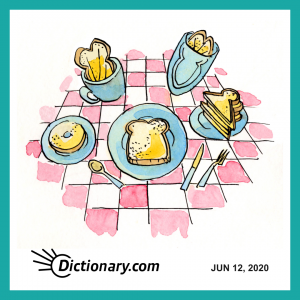Word of the Day
stridulate
verb (used without object)
to produce a shrill, grating sound, as a cricket does, by rubbing together certain parts of the body.
More about stridulate
The English verb stridulate, “to produce a shrill, grating sound like that of a cricket,” is an English derivative of the English noun stridulation, which comes from French stridulation. The French noun is a derivative of the New Latin verb strīdulāre “to produce a shrill, grating sound,” a derivation of the classical Latin adjective strīdulus, itself a derivation of the noun strīdor “a high-pitched sound.” Strīdere, the classical Latin equivalent of New Latin strīdulāre, is related to Greek trízein “to buzz, squeak,” and a little farther out of town, to Tocharian A trisk– “to drone” (Tocharian is the group name for two or three related Indo-European languages, now extinct, spoken in what is now Chinese Turkestan). The Latin, Greek, and Tocharian forms derive from the onomatopoeic Proto-Indo-European root (s)trei– “to buzz, hiss.” Strīdere and trízein are related to Greek strínx, stríx (stem stríng-, stríg-) “owl, night raven,” and to Latin strix (stem strig-) “an owl, bird of ill omen, evil spirit, vampire.” Either Latin strig– or Greek stríg– was the source of Vulgar Latin striga “evil spirit, witch, hag,” which becomes strega “witch” in modern Italian, as in the late Tomie DePaola’s series of wonderful children’s books “starring” Strega Nona, “Granny Witch.” Stridulate entered English in the first half of the 19th century.
how is stridulate used?
To stridulate, or chirr, one of the minor achievements of the cricket, your species is dependent on the intestines of the sheep and the hair of the horse.
Even so most often does the singing insect stridulate: it is celebrating life.
stridulate


panivorous
adjective
subsisting on bread; bread-eating.
More about panivorous
The English adjective panivorous “bread-eating” comes from the Latin noun pānis (inflectional stem pāni-) “bread” and the Latin combining form -vorus “devouring,” a derivative of the verb vorāre “to eat up, devour” (pānivorus does not occur in Latin).

how is panivorous used?
I ate it toasted for breakfast and took it to school as the foundation of my lunch sandwich. An equivocal frisson traversed my now infinitely more sophisticated panivorous spirit when I read that Wonder Bread’s parent company filed for bankruptcy in 2012.
the people who persevered in their panivorous propensities, accused the emperor of selling our corn to the English.
panivorous


klatsch
noun
a casual gathering of people, especially for refreshments and informal conversation: a sewing klatsch.
More about klatsch
You usually associate klatsch “a casual party” with coffee klatsch “a casual gathering for gossiping and drinking coffee.” Coffee klatsch is a partial rendering of German Kaffeeklatsch (in English kaffee klatsch or kaffee klatch). Coffee and Kaffee need no explanation. Klatsch is informal German for “gossip, gossiping,” from the verb klatschen, of imitative origin. In German Klatsch also means “a slap, a crack (as of a bat), a clap (of the hands).” Klatsch (klatch) entered English in the 1950s.
how is klatsch used?
Maybe they didn’t have anything in common and that was the point, was the thing that made the klatsch interesting, hearing the various perspectives people had.
At coffee-break time, Billy made a nice addition to our little klatsch.
klatsch





